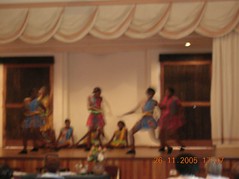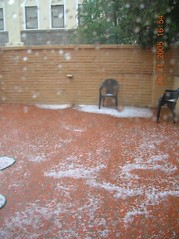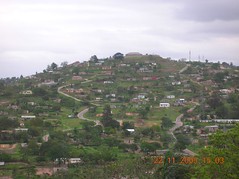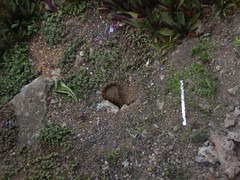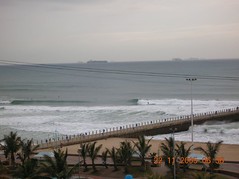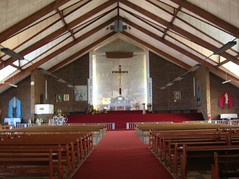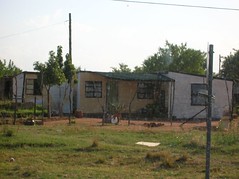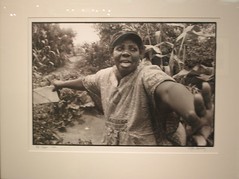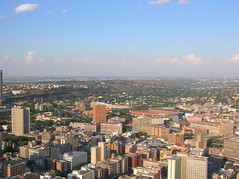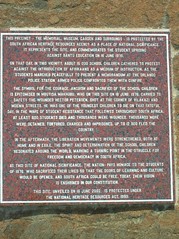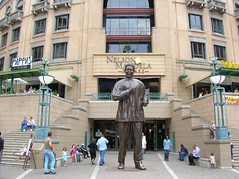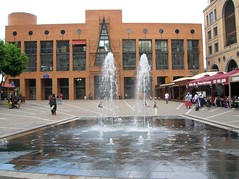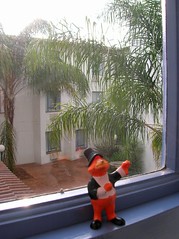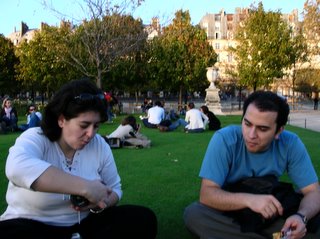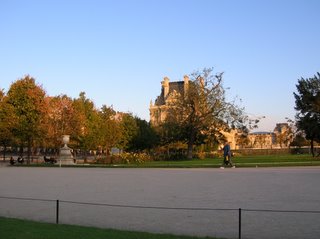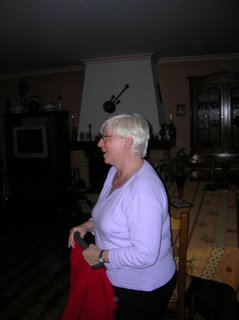About South Africa / A propos de l’Afrique du SudI dedicate this post to all the South-Africans of all origins who died, suffered imprisonment, or just took the risk to get out there, to make the Rainbow State a better place. I dedicate this post to all those who suffered unjustly because of their gender, color, religion, sexual orientation or political opinions.Je dedie ce texte a tous les Sud-Africains de toutes origines qui sont morts, ont ete emprisonnes, ou qui ont simplement pris le risque de s’exposer pour que l’Etat Arc-En-Ciel soit un meilleur pays. Je dedie ce texte a tous ceux qui ont injustement souffert, en raison de leur sexe, couleur, relition, orientation sexuelle, ou opinions politiques.South Africa is famous for its ominous apartheid era. Though this segregation system was abolished 10 years ago, it still hovers in the mind of all who thread its soil. Indeed, the wounds are not yet healed. I will further in another post the aftermath of Apartheid as I observe it in Jo’Burg, but for now, let’s go down the road of past history, to better understand the present.
L’Afrique du Sud est celebre pour l’infame periode de l’Apartheid. Bien que ce systeme de segregation ait ete aboli il y a 10 ans, il plane toujours dans l’esprit de ceux qui foulent son sol. En effet, ses blessures ne sont toujours pas gueries. Dans un texte subsequent, je ferai le decompte de l’abolition de l’Apartheid tel que je l’observe a Jo’Burg. Mais pour le moment, explorons le passé, afin de mieux comprendre le present.The first inhabitants The first known inhabitants of South Africa were the Bochiman, also known as San, and the Hottentots, also know as Khoikhoi. The Bantu then emigrated in the region. The iron-age technologies developed by these early inhabitants were not surpassed in Europe until the Industrial revolution of the 19th century.
Les premiers habitantsLes premiers habitants connus en Afrique du Sud etaient les Bochiman, aussi connus sous le nom de San, et les Hottentots, aussi appeles Khoikhoi. Les Bantu migrerent plus tard dans la region. Les technologies de l’age de fer de ces premiers habitants n’ont pas ete surpassees en Europe avant la Revolution Industrielle du 19eme siecle.Who are the Afrikaners? As a by-product of the European race to Asia, the Dutch East India Company implemented the first European settlement in South Africa in 1652. This was on the Cape of Good Hope, known today as Cape Town. Cape Town is at the tip of Africa, on the western fringe. The original colony grew and this early settlement became the destination of Dutch Calvinists and other European Protestants who were fleeing religious repression. Overtime, they developed their own language, Afrikaans, a mutated version of Dutch.
The settlers, known today as the Afrikaners or Boers, became a close-knit community and imported slaves from other African regions and South-East Asia. This was one of the root origins of the people denominated under the Apartheid as “colored”.
Qui sont les Afrikaners?Un effet secondaire de la course Europeenne vers l’Asie, la Compagnie Hollandaise des Indes Orientales fonda la premiere colonie europeenne en Afrique du Sud en 1652. C’etait au Cap de Bonne Esperance, connu aujourd’hui sous le nom de Cape Town. Cape Town est au bout de l’Afrique, sur l’extremite occidentale. La colonie du debut a grandi et ce premier comptoir devint la destination des Calvinists Hollandais et d’autres Protestants Europeens fuyant la repression religieuse. Avec le temps, ils developpernet leur proper langue, l’Afrikaans, une version mutee du Hollandais.Les colons, connus aujourd’hui sous le nom d’Afrikaners ou de Boers, devinrent une communite tricotee serre et importerent des esclaves d’autres regions d’Afrique et d’Extreme Orient. Il s’agit d’une des origins des gens appeles sous le regime de l’Apartheid “gens de couleur”.The first clashes Between 1652 and 1779, the Afrikaners expanded East of Cape Town and clashed violently with the Bantu tribes. The Xhosa put their expansion to a halt in the first tribal war in 1779.
Premiers conflitsEntre 1652 et 1779, les Afrikaners s’etendirent a l’Est de Cape Town et affronterent violemment les tribues Bantu. Les Xhosa arreterent leur expansion pendant la premiere guerre tribale en 1779. English occupation In 1806, the English annexed Cape Town. This led to further exile and Boer expansion away from Cape Town. In 1834, England abolished slavery. In Cape town, over 35000 black slaves were emancipated. This led to much discontent in the Afrikaner community, who perceived this to be an unacceptable interference in their affairs. As a result, what is known as the Grand Trek in history happened : countless Boer families migrated across the Orange River deep in the country to what is now Bloemfontein in the Free State (an actual province of South Africa).
L’occupation BritanniqueEn 1806, les Anglais annexerent Cape Town. Le resultat direct fut l’exil loin de Cape Town et l’expansion des Boers en territories inexplores. En 1834, l’Angleterre abolit l’esclavage. Au Cap, plus de 35000 esclaves noirs sont emancipates. Cela mecontenta, la communaute Afrikaner, laquelle perçut cette mesure comme une ingerence inacceptable dans leur affaires. Ce fut la cause directe de ce qui est connu dans l’histoire comme le Grand Trek: d’innombrables familles Boer migrerent au dela de la Riviere Orange, au coeur du pays, et fonderent Bloemfontein dans le FreiStadt (aujourd’hui une province d’Afrique du Sud).War, war, and more warAlthough the English had abolished slavery, this did not make them allies to the Zulu and Xhosa tribes. Their pressure, combined with the Boer migration, allowed the Zulu king Shaka to come to power. He waged war mercilessly on the neighboring tribes and caused immense suffering and a mass migration of the Bantu tribes in what was known in history as
difaqane (the Scattering). Eventually, the Zulu were defeated by combined British and Boer forces. However, their relationship remained tense as the Boers harbored a secessionist agenda, which concretized in the Boer Republics of Free State and Transvaal.
La guerre, la guerre, et encore la guerreBien que les Brittaniques aient aboli l’esclavage, ils n’etaient pas allies des tribues Zulu and Xhosa. Leurs pression, en conjonction avec la migration des Boer, permis au roi Zulu, Shaka, d’atteindre le pouvoir. Il fit la guerre sans pitie aux tribus voisines, causant ainsi de grandes souffrances et de massifs mouvements de populations Bantu, connus aujourd’hui dans l’histoire comme le difaqane
(l’Eparpillement). Eventuellement, les Zulu furent vaincus par la combinaison des forces britanniques et Boer. Cependant, leur relation resta tendu, car les Boers avaient un agenda secessioniste, lequel se contretisa dans les Republiques Boer de Frei Stadt et du Transvaal.Diamonds and GoldIn 1867, diamonds were discovered in Kimberley and gold was discovered in 1886 on the Witwatersrand ridge in Johannesburg. This attracted both English miners who were heavily taxed but unable to vote in the Boer Republics and British imperialists to the Boer Republics, much to the irritation of the Boer farmers.
Amongst them, a British businessman, Cecil Rhodes, found interest in the Boer Republics. His interest was for British rule to overrun the Boer Republics, thus he fomented uprisings amongst the English miners.
Or et Diamants En 1867, des diamants furent decouverts a Kimberley, et de l’or fut decouvert en 1886 sur la chaine du Witwatersrand a Johannesburg. Au mecontentement des fermiers Boers, ceci attira dans les Republiques Boers a la fois des mineurs anglais, surtaxes mais interdits de vote, et des imperialists britanniques. Parmis eux, un homme d’affaire britannique, Cecil Rhodes, pris interet dans les Republiques Boer. Ayant interet a etablir la suprematie britannique en Republique boer, il fomenta la revolte des mineurs anglais. The War of the BoersThe miner rebellions augmented the already existing tensions between Britain and the Afrikaners and in 1899, the war known as War of the Boers erupted. This was a cruel war, as Britain pursued a Scorched Earth policy to combat Afrikaner guerrilla, destroying homes, crops and livestock.
Between 1899 and the end of the war, 26 000 Afrikaner women and children died in what became known as the first concentration camps in history. In 1902, British rule over South Africa was confirmed and the Boer Republics were annihilated.
La guerre des BoersLes rebellions minieres aggraverent les tensions deja existante entre la Grande-Bretagne et les Afrikaners et 1899 vit l’eruption de la Guerre des Boers. Ce fut une guerre cruelle, car la Grande Bretagne appliqua la tactique de la terre brulee afin de contrer la guerrilla Afrikaner, detruisant foyers, cultures et betail.Entre 1899 et la fin de la guerre, 26 000 femmes et enfants Afrikaner moururent dans ce qui est maintenant reconnu comme les premiers camps de concentration de l’histoire. En 1902, le controle britannique sur l’Afrique du Sud etait confirme et les Republiques Boer detruites.The institution of Apartheid: a timelineThese are only a few dates to situate the history. I do not have the pretension of being exhaustive.
- 1910: the Union of South Africa was created, with the whites in total control of the in political scene. Moderate protestations on part of the black majority, in the form of strikes and political gatherings were mercilessly repressed.
- 1948: the Afrikaner National Party won the elections and went further in preventing all non-whites from having any political or economical power. Brutal enforcement of this is common practice.
- ? : Creation of the African National Congress, first organization against apartheid. In response to the government’s unwillingness to undertake reforms, the ANC undertakes guerilla.
- 1960: one of the bloodiest episodes of the repression happens in the Sharpeville massacre.
- 1960’s: arrestation and imprisonment of ANC political activists, including Nelson Mandela.
- 1970’s: creation of the Bantustans, theoretically independent countries and so-called Black homelands (Transkei, Cickei, Bophutswana and Venda.) All blacks within “white” designated areas are considered guest workers and thus lose all political rights. Not having a residence pass means being deported to a “home” land.
- 1976: dozens of Soweto school children protesting against the imposition of Afrikaans in school are shot by the police. Following this event, Soweto was the stage of bloody and senseless murders of black children by the Police. This marks the beginning of international awareness of the fate of the black South-Africans.
Without dates, I will add that political activists were such as the well-known Steve Biko imprisoned, tortured, and killed. Settlements were evacuated and bulldozed, such as the “colored” suburb of District 6, in Cape Town.
L’institution de l’Apartheid: quelques datesIl ne s’agit ici que de quelques dates dont le but est de situer l’histoire. Je n’ai nullement l’intention d’etre exhaustive.- 1910: L’ Union de l’Afrique du Sud est creee, avec les blancs en controle total de la scene politique. Des protestations moderees de la majorite noire, prenant forme de greves et de regroupements politiques, sont reprimes sans pitie.
- 1948: le Parti National Afrikaner gagne les elections et va plus loin dans l’exclusion des non-blancs du pouvoir politique et economique. La brutalite policiere est de coutume.
- ? : Creation de l’African National Congress, premiere organisation anti-apartheid. Devant la mauvaise volonte du gouvernement, l’ANC se tourne vers la guerilla.
- 1960: un des episodes les plus sanglants de la repression se produit lors du massacre de Sharpeville.
- Annes 60: arrestation and emprisonnement d’activistes politiques de l’ANC, y compris Nelson Mandela.
- 1970’s: creation des Bantustans, en theorie des etas independent et pretendument lieux d’origine des noirs (Transkei, Cickei, Bophutswana and Venda.) Tout noir en territoire designe comme etant “blanc” est considere comme un travailleur etranger et perd ainsi tous droits politiques. Ne pas avoir de laisser-passer residential signifie la deportation dans un Bantustan.
- 1976: des douzaines d’ecoliers de Soweto protestant contre l’imposition de l’Afrikaans comme langue d’instruction sont abattus par la police. A la suite de cet evenement, Soweto devient le theatre de meurtres sanglants et insenses d’enfants noirs par la Police. Ceci marque le debut de la conscience internationale du destin des noirs d’Afrique du Sud.
Sans dates, j’ajoute que des activistes politiques tells que le bien connu Steve Biko furent emprisonnes, tortures, et tues. Des lieus d’habitations furent evacuees et rases, comme la banlieue “de couleur” connue sous le nom de District 6, a Cape Town. International politics during apartheidWhile Angola, Mozambique and Zimbabwe were successfully fighting for liberation and implementing Marxist inspired governments, South Africa was becoming more and more of an isolated case.
This led to aggressive behavior on the part of the South-African government and to the invasion of South Angola by the South-African army. South Africa also refused to participate in earnest negotiations about the independence of Namibia and sponsored anti-revolutionary groups in Mozambique and Angola.
La politique internationale pendant l’apartheidAlors que l’Angola, le Mozambique et le Zimbabwe menaient avec success les luttes de liberation et voyaient naitres des gouvernements d’inspiration Marxiste, l’Afrique du Sud devenait de plus en plus un cas isole.En reaction, le gouvernement sud-africain adopta une politique d’aggression et envahit le sud de l’Angola. Dans la foulee, l’Afrique du Sud refusa egalement de participer aux negotiations concernant l’independance de la Namibie et commandita des groupes anti-revolutionaires au Mozambique et en Angola.At last, international awarenessAfter the riots in Soweto in 1976, awareness budded in the minds of the white Johannesburg university students. The Chinese government sent official letters of support to the liberation fighters of Soweto. In the West, citizens became more aware and civil society movements for racial equality erupted. Eventually, the UN imposed economic and political sanctions.
In response to international pressure, the South-African government made concessions aimed at pleasing the international community and instituted a new parliament constituted of whites, colored (mixed race) and Indians, but still excluding the black South-African citizens. Needless to say, this was considered to be insufficient by the UN and the international community.
Enfin, une conscience internationaleApres les emeutes de Soweto en 1976, une conscience emergea dans les esprits des etudiants universitaires blancs de Johannesburg. Le gouvernement chinois envoya des lettres officielles de support aux combatants de la liberation de Soweto. En Occident, les citoyens devinrent plus conscients et des mouvements de solidarite sociale pour l’egalite raciale virent le jour. Eventuellement, l’ONU imposa des sanctions economiques et politiques. En reponse aux pressions internationale, le gouvernement sud-africain fit des concessions dont le but evident etait de plaire a la communaute internationale et constitua un nouveau parlement constitue de blancs, gens de couleur et d’indiens, maintenant par ailleurs l’exclusion des Sud-Africains noirs. A l’evidence, ce geste fut considere comme insuffisant par l’ONU et la communaute internationale.ChangeIn 1989, Frederick W. DeKlerk was elected president of South-Africa. In response to the pressures from the international community, the release of political prisoners began. Amongst them was the famed Nelson Mandela, tribal king and leader of the ANC, who was imprisoned for nearly 30 years. DeKlerk initially proposed to free political activists without repealing the act that rendered black political activity illegal. Mandela refused to be freed without political rights, and eventually, obtained the signing of a peace agreement with ANC and other anti-apartheid groups and the annulment of the Bantustan’s institution. Nelson Mandela was freed on February 11th, 1990.
In 1994, the country’s first democratic elections took place, with Nelson Mandela’s ANC winning 62.7% of the votes, and the “white” party gaining 20.4%, enough to enable representation. This was as well the period of the national reconciliation commissions, which allowed South-African citizens of all ethnicities to express anger, remorse and forgiveness. Not everyone agreed, but Mandela’s philosophy was to allow the white South-Africans to remain, and to foster harmonious rapports amongst all citizens.
ChangeEn 1989, Frederick W. DeKlerk fut elu president d’Afrique du Sud. En reponse aux pressions internationales, la liberation des prisonniers politiques fut amorcee. Parmi eux, le celebre Nelson Mandela, roi tribal and chef de l’ANC, qui fut emprisonne pendant presque 30 ans. A l’origine, DeKlerk proposait de liberer les activistes politiques sans annuler la regle rendant l’activite politique noire illegale. Mandela refusa d’etre libere sans droits politiques, et eventuellement obtaint la signature d’un traite de paix avec l’ANC et les autres groupes anti-apartheid et l’annulation des Bantustans. Nelson Mandela fut libere le 11 fevrier 1990.En 1994, les premieres elections democratiques du pays eurent lieu. L’ANC, representee par Nelson Mandela, gagne avec 62.7% des votes, et le parti “blanc” obtint 20.4%, suffisamment pour etre represente en chambre. Ce fut egalement la periode des commissions nationales de reconciliation, qui permirent au citoyens sud-africains de toutes ethnicites d’exprimer colere, remord et pardon. Ce ne fut pas unanyme, mais la philosophie de Mandela etait de permettre aux Sud-Africains blancs de rester, et de permettre l’etablissement de rapports harmonieux entre tous citoyens.What now?In 1999, the country voted again. Although Mandela retired, the ANC won the elections once again. Thabo Mbeki is now the current president. Early on, his presidency was welcomed with a reasonable amount of skepticism, as the general public did not know him quite as well as his predecessor, Nelson Mandela.
In the early days of his presidency, Mbeki was the target of a fair amount of criticism as he apparently denied the existence of the South-African HIV-AIDS crisis, a situation that a number of international organizations acknowledged to be a humanitarian emergency.
One of his bolder moves was a power-sharing deal with the New National Party (the reformed architects of Apartheid), to face the co-opting opposition parties.
From 2001 up to recently, Mbeki has given reasons to worry to foreign investors and white landowners. Indeed, Zimbabwe’s president Mugabe has pursued an aggressive (if not violent) reclamation of white-owned farms. Mbeki’s obliviousness to this policy has been interpreted as tacit support and creating fear for white-owned land, further leading to an alarming devaluation of the Rand, the local currency.
What now?En 1999, le pays vota de nouveau. Bien que Mandela a pris sa retraite, l’ANC gagne une fois de plus les elections. Thabo Mbeki est le president actuel. Au depart, sa presidence fur accueillie par une part raisonnable de scepticisme, car il etait moins bien connu du grand public que son predecessor, Nelson Mandela. Au debut de son mandat, Mbeki fut la cible d’une part raisonnable de critique, alors qu’il nia l’existence de la crise sud-africaine du VIH-SIDA, une situation reconnue comme une urgence humanitaire par nombre d’organisations internationales.Un de ses gestes les plus audacieux fut de faire une entente de partage de pouvoir avec le New National Party (les architectes de l’Apartheid rebaptises), afin de faire face a l’opposition.De 2001 a recemment, Mbeki a donne un motif d’inquietude aux investisseurs etrangers et aux proprietaires terriens blancs. En effet, le president du Zimbabwe, Mugabe, poursuit depuis 4 ans une politique aggressive (sinon violente) de reclamation des fermes appartenant aux blancs. L’absence de reaction de Mbeki a cette politique est interprete comme un support tacite et cree de vives inquietudes concernant les terres appartenant aux sud-africains blancs, menant directement a une devaluation alarmante du Rand, la monnaie locale.Source:
Africa on a shoestring (Lonely Planet)
